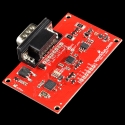DrewMangus
Member Since: December 19, 2010
Country: United States
-
There is a Metal Nut underneath.
-
Yes, they will indeed.
-
I just received this interesting little doodad, I'm using it with a Teensy 3.0 and here is some demo Code I wrote for it. Maybe it can help some others out. I haven't had the issue with it that others have been seeing described as poor build quality. Also, the comment from Member #333036 was pretty spot on as far as pin out. I used the encoder library from PJRC found here example which handles this device well. It does however increment +-4 every tick of the detent so just be careful when coding.
#include Encoder encoder(A5, A4); //These 2 pins are A and B of the encoder side, C is connected to ground const int redPin = 10; const int greenPin = A8; const int bluePin = 9; volatile boolean encoder_button = false; void setup() { Serial.begin(9600); pinMode(A3, INPUT); pinMode(redPin, OUTPUT); pinMode(greenPin, OUTPUT); pinMode(bluePin, OUTPUT); attachInterrupt(A3, buttonPush, CHANGE); } void loop() { int32_t value; value = encoder.read(); Serial.print("value = "); Serial.println(value); if (Serial.available()) { Serial.read(); Serial.println("Reset Encoder to Zero"); encoder.write(0); } if(encoder_button) { for(int i=0; i< 20; i++) //Careful with this if you or a friend has epilepsy { setColor(255, 255, 255); delay(10); setColor(0, 0, 0); delay(100); } encoder_button = false; Serial.println("Button Pushed"); } else { setColor(value,0,0); delay(1000); setColor(0,value,0); delay(1000); setColor(0,0,value); delay(1000); } } void buttonPush() { encoder_button = true; } void setColor(int red, int green, int blue) { analogWrite(redPin, red); analogWrite(greenPin, green); analogWrite(bluePin, blue); } -
It's mostly the read function from what I debugged, I ended up with this and it works as far as I can tell on my 1999 Explorer.
//Define Serial Ports so I remember which is which #define PC Serial #define OBD Serial2 //Set up ring buffer char rxData[20]; char rxIndex=0; void setup() { PC.begin(9600); OBD.begin(9600); ODB_init(); } void loop() { PC.println(getRPM()); //Print the int returned from getRPM delay(2000);//wait 2 seconds and grab another reading } void ODB_init(void) { //Wait for a little while before sending the reset command to the OBD-II-UART delay(2000); //Reset the OBD-II-UART OBD.print("ATZ\r"); //Wait for a bit before starting to send commands after the reset. delay(2000); OBD_read(); OBD.print("ATE0\r"); OBD_read(); OBD.flush(); } int getRPM(void) { //Query the OBD-II-UART for the Vehicle rpm OBD.flush(); OBD.print("010C\r"); OBD_read(); return ((strtol(&rxData[6],0,16)*256)+strtol(&rxData[9],0,16))/4; } void OBD_read(void) { char c; do{ if(OBD.available() > 0) { c = OBD.read(); PC.print(c); if((c!= '>') && (c!='\r') && (c!='\n')) //Keep these out of our buffer { rxData[rxIndex++] = c; //Add whatever we receive to the buffer } } }while(c != '>'); //The ELM327 ends its response with this char so when we get it we exit out. rxData[rxIndex++] = '\0';//Converts the array into a string rxIndex=0; //Set this to 0 so next time we call the read we get a "clean buffer" }Sorry if that code is formatted super funky, First post with code in it ^_^
Cheers hope that helps out somebody.
-
--Why was he retired? --He got old. Then some thumb-sucker came along and tagged him "RED". --Red? --Yeah, RED. R-E-D, "Retired, Extremely Dangerous".
I thought this fit though it is a movie quote.
No public wish lists :(



